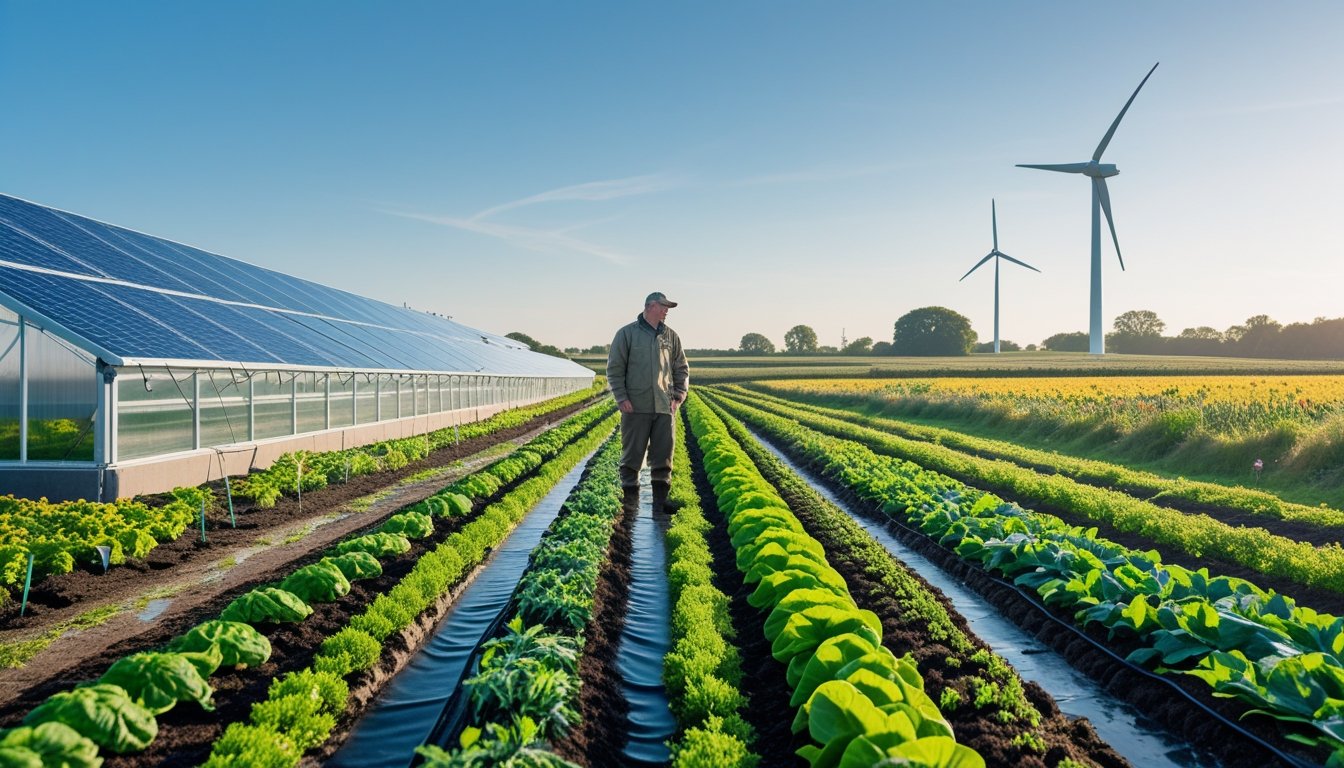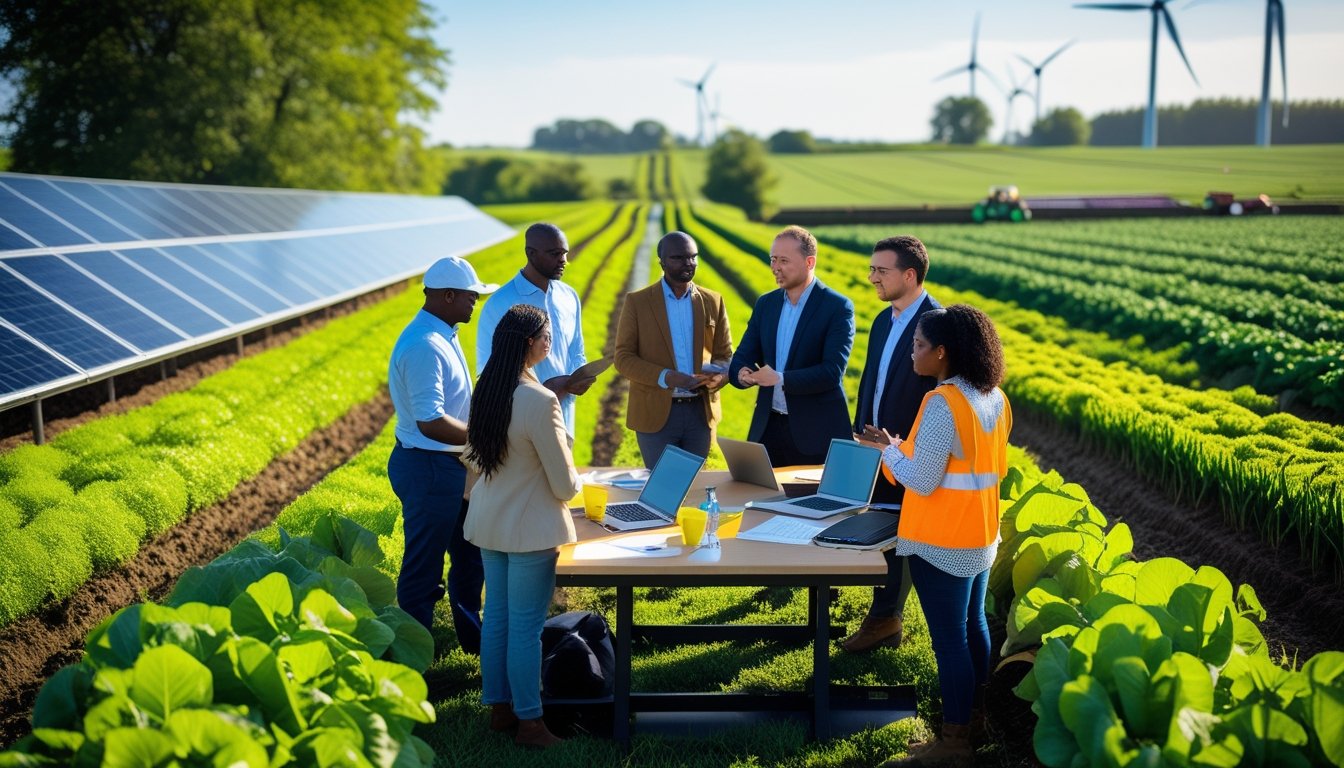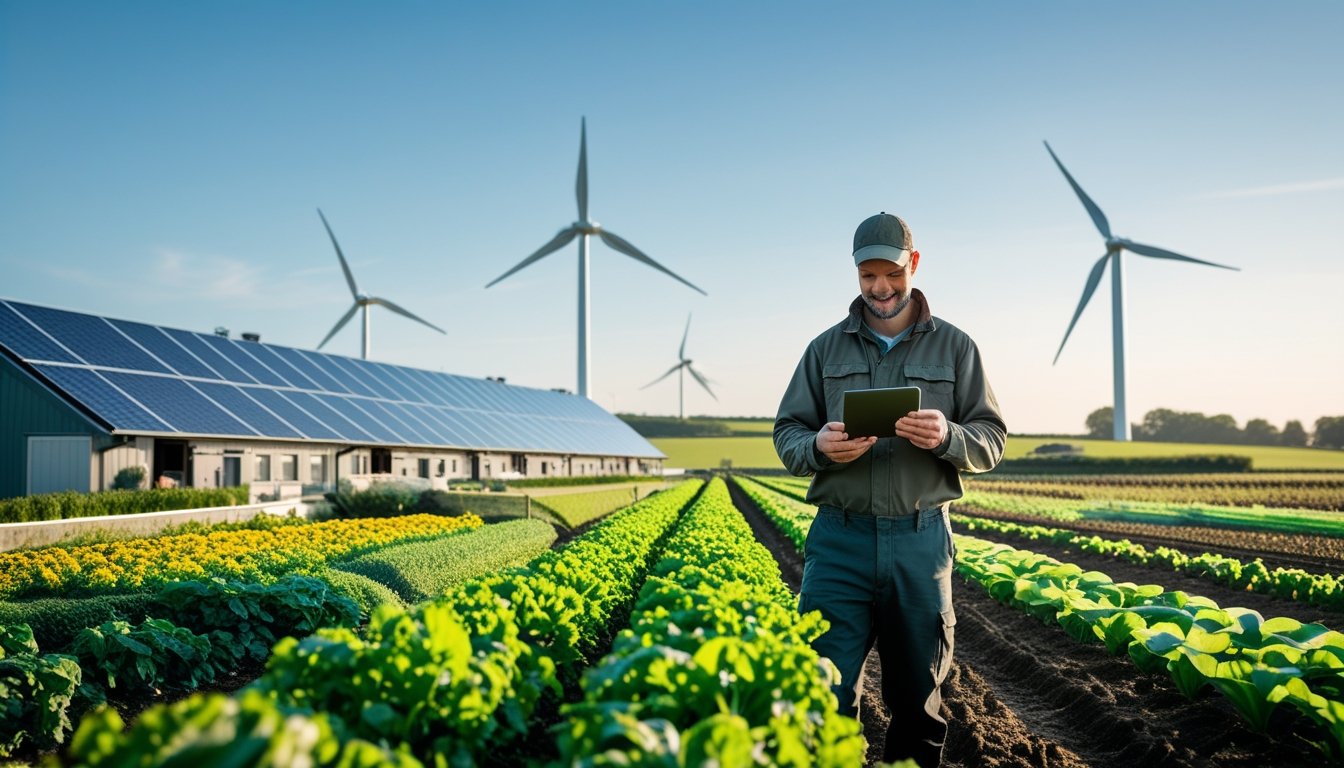Late updated: 29 Jul 2025 13:07
Written by: Oliver Bennett
Sustainable Farming Innovations In The UK: Advancements Shaping the Future
Sustainable farming in the UK is at a transformative juncture. With increased pressure on agricultural practices to both enhance productivity and safeguard the environment, embracing sustainable innovations is vital. The UK is pioneering advancements such as precision agriculture, agroecology, and vertical farming to minimise environmental impacts while increasing efficiency.

Investment in farming innovation has seen significant growth, with government funding driving advancements in technology and sustainable practices. Key efforts involve integrating technology into farming operations, which includes data-driven approaches and robotic automation. As we explore these critical areas, we also see how these advancements align with supportive policies and collaboration to achieve sustainable farming goals.
By focusing on technology, collaboration, and policy, the future of sustainable farming in the UK looks promising. Government support is pivotal, with funding initiatives like the Farming Innovation Programme and renewed seasonal worker schemes providing essential support. Such initiatives not only bolster productivity but also ensure that sustainable practices are at the forefront of the industry.
Key Takeaways
- Innovations are advancing sustainable farming in the UK.
- Government funding is crucial for driving technological progress.
- Collaboration and policy support sustainable agriculture goals.
Core Innovations Shaping Sustainable Farming in the UK
Sustainable farming in the UK relies heavily on technological advancements to optimise productivity and reduce environmental impact. Key innovations include robotics, AI-driven crop monitoring, vertical farming, and water management systems. These tools are reshaping agriculture, making farms more resilient and efficient.
Advanced Robotics and Automation
Robotics are transforming UK agriculture. Automated machines are streamlining labour-intensive tasks like planting, harvesting, and sorting. The Farming Innovation Programme supports this transition, ensuring UK farms can harness cutting-edge technologies. By reducing manual labour and increasing precision, we enhance productivity and reduce costs.
Defra, in partnership with Innovate UK, invests in these technologies, fostering significant improvements across the farming sector. The integration of robots reduces human error and facilitates consistent quality. This is crucial for meeting the growing demand for locally sourced produce. Sustainable farm management is now not just feasible but more accessible.
AI and Precision Crop Monitoring
Artificial Intelligence is revolutionising how we manage crops. Tools like AI-powered drones and sensors monitor field conditions, providing real-time insights into plant health and soil quality. These technologies enable precision agriculture practices that improve crop yields and reduce waste.
Collaborations with UK Research and Innovation are pivotal here. By collecting and analysing vast amounts of data, AI systems suggest optimal planting strategies. This method not only boosts efficiency but also cuts down on excessive resource use, such as water and fertilisers. Farmers can maintain productive and sustainable operations through informed decision-making.
Vertical Farming and Urban Agriculture
Vertical farming is shifting the landscape of urban agriculture. By growing crops in stacked layers, we maximise space use, making it ideal for urban environments. These farms use LED lighting and hydroponics to produce a variety of crops with minimal land use.
This innovation reduces the need to transport food over long distances, thereby cutting carbon emissions. UK farms adopting vertical frameworks benefit from year-round yields, independent of weather conditions. Urban agriculture initiatives supported by local governments provide communities with fresh produce, reinforcing food security while promoting green technology.
Smart Irrigation and Water Management
Effective water management is essential for reducing agriculture’s environmental impact. Smart irrigation systems apply water precisely when and where it's needed, minimising wastage. Technologies like soil moisture sensors help us maintain optimal hydration levels, crucial for maintaining soil health and crop vitality.
This approach also conserves water resources and reduces erosion, aligning with broader sustainability goals. With the support of Defra and Innovate UK, these systems are becoming standard across UK agriculture. Farmers adopting smart irrigation experience increased resilience to drought conditions. These advancements are integral to sustainable farming strategies, ensuring long-term viability and environmental stewardship.
Collaboration, Policy, and Research Driving Sustainable Practices

In the UK, sustainable farming innovations are being propelled by the collective efforts of stakeholders, effective policies, and pioneering research. These elements are driving substantial progress in sustainable practices, ensuring a robust agricultural future.
Funding and Support for Agricultural Innovation
The Farming Innovation Programme spearheads funding initiatives, providing vital support for sustainable farming projects across England. This programme is backed by entities like DEFRA and UK Research and Innovation, ensuring ample resources are available for emergent technologies. By focusing on sustainability, biodiversity, and productivity, these funds enable farmers and researchers to develop innovative solutions that address climate change.
The aim is to bolster food security and resilience in the agricultural sector. Financial support catalyses advancements in areas such as soil health and pest management. As funding facilitates growth in these areas, it provides an essential foundation for long-term sustainability.
Collaborative Approaches Among Farmers and Industry
Collaboration between farmers, growers, and industry experts is a cornerstone of innovative sustainable practices. These partnerships foster a shared commitment to sustainability. Farmers are increasingly engaging with organisations and researchers to adopt practices that enhance productivity while preserving the environment.
This cooperative model leads to increased knowledge sharing and resource pooling. Collaborative initiatives support the integration of horticultural and forestry practices, thus enhancing ecological and economic resilience. The exchanges between partners allow for the development of tailored solutions addressing unique challenges in sustainable agriculture.
Research Advancements and Knowledge Transfer
Research plays a pivotal role in driving innovation in sustainable farming. Through collaboration between academic institutions and industry, research breakthroughs are swiftly transferred to practical applications. This leads to a dynamic flow of information, enabling effective adoption of advanced techniques by farmers.
Programmes facilitated by entities like Innovate UK focus on the latest agricultural research areas, including improving crop yields and enhancing soil fertility. The integration of research findings into real-world farming practices helps mitigate the impacts of climate change. Our commitment to knowledge transfer ensures that cutting-edge advancements are accessible to all stakeholders in the agricultural sector.
Frequently Asked Questions

In sustainable farming throughout the UK, several innovations focus on enhancing soil health, conserving water, integrating renewable energy, promoting biodiversity, diversifying crops, and adopting precision agriculture. These advancements contribute significantly to improving the sustainability and resilience of the nation's agricultural practices.
What are the leading technologies being used to enhance soil health in British farms?
Innovative approaches include using biochar, regenerative agricultural practices, and silicon-based fertilisers to improve soil structure and fertility. Technologies like AI-assisted soil monitoring provide detailed insights into soil conditions, which help farmers make informed decisions about crop rotation and nutrient management.
How have recent advancements in water conservation methods impacted UK agriculture?
Water conservation is undergoing a transformation with the introduction of precision irrigation systems and rainwater harvesting strategies. These advancements have helped mitigate the risks of water scarcity by ensuring that farms use water more efficiently, thus maintaining productivity in variable climate conditions.
In what ways is renewable energy being integrated into farming practices across the United Kingdom?
Farms are increasingly adopting solar panels and wind turbines to generate their own renewable energy. Innovations like biogas production from organic waste are also becoming more common, allowing farms to reduce reliance on fossil fuels and decrease their carbon footprint.
What initiatives support biodiversity in UK farming systems?
Efforts to promote biodiversity include creating wildlife corridors, hedgerow restoration projects, and the reintroduction of native plant species. These initiatives aim to create habitats that support birds, pollinators, and other beneficial organisms, enhancing ecosystem health and agricultural productivity.
How are crop diversification strategies contributing to sustainable agriculture in the UK?
Crop diversification helps reduce pests and diseases while improving soil fertility. By including a variety of crops such as legumes, farmers can break pest cycles and fix atmospheric nitrogen, reducing the need for chemical fertilisers and improving overall farm resilience and economic stability.
What role does precision agriculture play in improving sustainability on UK farms?
Precision agriculture employs GPS technology and data analytics to optimise planting, watering, and harvesting practices. By precisely matching resources to crop needs, farms can significantly reduce waste, lower costs, and increase crop yields, thus enhancing the sustainability of agricultural operations.
